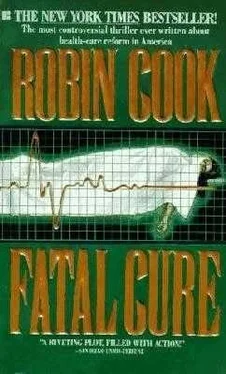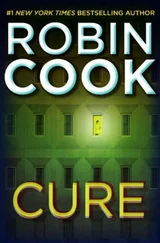Panic-stricken, David listened to Marjorie's chest. There was more congestion than earlier but still not enough to explain her clinical state. Rushing back to the nurses' station, David demanded to know why he hadn't been called.
"Called on what?" Janet Colburn asked. She was the head nurse.
"Marjorie Kleber," David yelled while he wrote orders for more stat bloodwork and another portable chest X ray.
Janet consulted with several of the other floor nurses, then told David that no one had noticed any change. She even said that one of the LPNs had just been in Marjorie's room less than half an hour previously and had reported no change.
"That's impossible," David snapped as he grabbed the phone and started making calls. Earlier, he'd been reluctant to call in consults. Now he was panicked to get them to come in as soon as possible. He called Marjorie's oncologist, Dr. Clark Mieslich, and an infectious disease specialist, Dr. Martin Hasselbaum. Neither of them were CMV doctors. David also called a neurologist named Alan Prichard, who was part of the CMV organization.
All three specialists were available for David's call. When they heard David's frantic appeal and his description of the case, they all agreed to come in immediately. David then called Susan to alert her to what was happening. He told her to advise the patients who came into the office that he would be delayed.
The oncologist was the first to arrive, followed in short order by the infectious disease specialist and the neurologist. They reviewed the chart and discussed the situation with David, before descending en masse on Marjorie. After examining her closely they withdrew to the nurses' station to confer. But hardly had they begun to discuss Marjorie's condition when disaster struck.
"She's stopped breathing," a nurse yelled from Marjorie's room. She'd stayed behind to clean up the debris left by the examining specialists.
While David and the consults raced back, Janet Colburn called the resuscitation team. They arrived in minutes and converged on room 204.
With so much manpower immediately available, Marjorie was quickly intubated and respired. It had been done with such dispatch that her heart rate did not change. Everyone was confident she'd experienced only a short period of decreased oxygen. The problem was they did not know why she'd stopped breathing.
As they began to discuss possible causes, her heart suddenly slowed and then stopped. The monitor displayed an eerie flat line. The resuscitation team shocked her in hopes of restarting her heart, but there was no response. They quickly shocked her again. When that didn't work, they began closed chest cardiac massage.
They worked frenetically for thirty minutes, trying every trick they could think of, but nothing worked. The heart would not even respond to external pacing. Gradually, discouragement set in, and finally, by general consensus, Marjorie Kleber was declared dead.
While the resuscitation team unhooked their wires and the nurses cleaned up, David walked back to the nurses' station with the consults. He was devastated. He could not imagine a worse scenario. Marjorie had come into the hospital with a relatively minor problem while he was off enjoying himself. Now she was dead.
"It's too bad," Dr. Mieslich said. "She was such a terrific person."
"I'd say she did pretty well considering the history in the chart," Dr. Prichard said. "But her disease was bound to catch up with her."
"Wait a second," David said. "Do you think she died of her cancer?"
"Obviously," Dr. Mieslich said. "She had disseminated cancer when I first saw her. Although she'd done better than I would have predicted, she was one sick lady."
"But there wasn't any clinical evidence of her tumor," David said. "Her problems leading up to this fatal episode seemed to suggest some sort of immune system malfunction. How can you relate that to her cancer?"
"The immune system doesn't control breathing or the heart," Dr. Prichard said.
"But her white count was falling," David said.
"Her tumor wasn't apparent, that's true," Dr. Mieslich said. "But if we were to open her up, my guess is that we would find cancer all over, including in her brain. Remember, she had extensive metastases when she was originally diagnosed."
David nodded. The others did the same. Dr. Prichard slapped David on the back. "Can't win them all," he said.
David thanked the consults for coming in. They all politely thanked him for the referral, then went their separate ways. David sat at the nurses' station desk. He felt weak and disconsolate. His sadness and sense of guilt at Marjorie's passing was even more acute than he'd feared. He'd come to know her too well. To make it even worse, she was Nikki's beloved teacher. How would he explain this to her?
"Excuse me," Janet Colburn said softly. "Lloyd Kleber, Marjorie's husband, is here. He'd like to talk to you."
David stood up. He felt numb. He didn't know how long he'd been sitting at the nurses' station. Janet directed him into the patients' lounge.
Lloyd Kleber was staring out the window at the rain. David guessed he was in his mid-forties. His eyes were red from crying. David's heart went out to the man. Not only had he lost a wife, but now he had the responsibility of two motherless children.
"I'm sorry," David said lamely.
"Thank you," Lloyd said, choking back tears. "And thank you for taking care of Marjorie. She really appreciated your concern for her."
David nodded. He tried to say things that reflected his compassion. He never felt adequate at moments like this, but he did the best he could.
Finally, David ventured to ask for permission to do an autopsy. He knew it was a lot to ask, but he was deeply troubled by Marjorie's swift deterioration. He wanted desperately to understand.
"If it could help others in some small way," Mr. Kleber said, "I'm sure Marjorie would want it done."
David stayed and talked with Lloyd Kleber until more members of the immediate family arrived. Then David, leaving them to their grief, walked over to the lab. He found Angela at the desk in her office. She was pleased to see him and told him so. Then she noticed his strained expression.
"What's wrong?" she asked anxiously. She stood up and took his hand.
David told her. He had to stop a few times to compose himself.
"I'm so sorry," Angela said. She put her arms around him and gave him a reassuring hug.
"Some doctor!" he chided himself, fighting tears. "You'd think I'd have adjusted better to this kind of thing by now."
"Your sensitivity is part of your charm," Angela assured him. "It's also what makes you a good doctor."
"Mr. Kleber agreed to an autopsy," David said. "I'm glad because I haven't the slightest idea why she died, especially so quickly. Her breathing stopped and then her heart. The consults all think it was her cancer. It probably was. But I'd like Bartlet to confirm it. Could you see that it gets done?"
"Sure," Angela said. "But please don't get too depressed over this. It wasn't your fault."
"Let's see what the autopsy shows," David said. "And what am I going to tell Nikki?"
"That's going to be hard," Angela admitted.
David returned to his office to try to see his patients in as short order as possible. For their sake, he hated being so backed up, but there had been no way to avoid it. He'd only managed to see four when Susan waylaid him between examining rooms.
"Sorry to bother you," she said, "but Charles Kelley is in your private office, and he demands to see you immediately."
Fearing Kelley's visit had something to do with Marjorie's death, David stepped across the hall into his office. Kelley was impatiently pacing. He stopped when David arrived. David closed the door behind himself.
Kelley's face was hard and angry. "I find your behavior particularly galling," he said, towering over David.
Читать дальше












